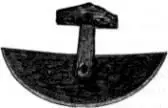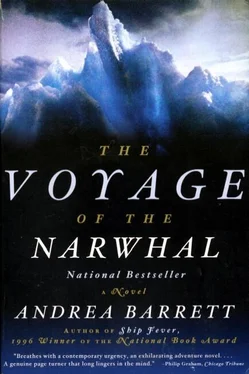As he spoke Nessark clasped his son’s shoulders, nodding but saying nothing, looking down when Tom continued to speak for some time after Erasmus had stopped. Two geese flew by, and a swarm of murres. The angekok stepped forward to speak for Nessark and the rest of the tribe but for a moment said nothing at all; only the birds’ thrumming wings broke the silence. Erasmus lowered his eyes and waited. He would be judged now, he thought. Alexandra’s presence by his side had altered every other aspect of this final journey, but she couldn’t spare him this. He might not be forgiven. He looked up again and caught the angekok’s stern gaze. When he spoke, Erasmus could hear in the words only the sound of running water and an echo of the wing beats.
The angekok paused so Tom could translate. They did not blame Erasmus for the loss of their sister’s body, Tom said. Their sister, Erasmus thought, looking from the boy to his judge and back. Tom ’ s mother. He would never be Tom again, that had never been his name; to which of those syllables did he answer? He himself, the angekok said, had determined that the tribe should guide Zeke out of their country; and he had permitted their sister and her son to leave them. His fault. His left hand folded around the teeth swaying on his chest. On her voyage of discovery, he said, she had been betrayed; when the poison took hold she had left her bones, so that she might save her son. The angekok pointed toward Erasmus’s feet — so small, he said. Who had taken the rest? He gave Alexandra an ulo and Erasmus an amulet of little bone knives, with which to cut through bad weather.
Still later the angekok, after speaking with the boy, led him down the shore and across the worn floes leaning against each other like drunken soldiers. At the water’s edge the boy handed over his collection. A skin laid flat against the ice, a bone laid here and another there; the angekok folded the pelt around the ill-sorted shards, chanting as he tied the bundle with a thong.
A few years later, as Zeke floated in the Rappahannock River, his face and chest above the blood-ribboned water, his shoulders bumping the hundreds of men who struggled, like him, to cross to the other side, something like a muskrat would brush his hands and Copernicus — drawn by the chaos, drawn by the wounds, always in movement but that day painting furiously on that bank — would see those dark shapes intertwine and wonder what they were. A war would have started by then, obscuring the arctic in people’s minds as if it were no more than legend: here are the hinges on which the world turns and the limits of the circuits of the stars.
But for the moment Erasmus and Alexandra stood on the shore, peering down at the water as the boy who had led them here knelt and slipped the bundle in.
AUTHOR'S NOTE AND ACKNOWLEDGMENTS

Most of the background characters in this novel — including Titian Peale, Charles Wilkes, John Rae, John Richardson, Elisha Kent Kane, Sir John Franklin and his crew, Louis Agassiz, Samuel Morton and the other naturalists and philosophers mentioned, as well as Ootuniah, Awahtok, Nessark, and the other Smith Sound Inuit who befriended Dr. Kane — are historical persons. The foreground characters — including Zechariah Voorhees, Erasmus Wells, Alexandra Copeland and their families, as well as Dr. Boerhaave, Ned Kynd, the crews of the Narwhal and the other ships mentioned, and Annie and Tom — are invented.
I'm indebted to the journals and memoirs of many nineteenth-century arctic explorers, particularly those of George Back, John Barrow, Edward Belcher, Alexander Fisher, John Franklin, William Godfrey, Charles Francis Hall, Isaac Hayes, Elisha Kent Kane, William Kennedy, George Lyon, Francis McClintock, Robert McClure, Sherard Osborn, William Edward Parry, Julius von Payer, John Rae, John Richardson, James Clark Ross, John Ross, Edward Sabine, Frederick Schwatka, William Scoresby, and Thomas Simp-son.
Also helpful were many more recent books about the arctic in the nineteenth and twentieth centuries, especially Pierre Berton's The Arctic Grail, George Corner's Dr. Kane of the Arctic Seas, Richard Cyriax's Sir John Franklin's Last Arctic Expedition, Ernest Dodge's The Polar Rosses, Peter Freuchen's The Arctic Year and Book of the Eskimos, Sam Hall's The Fourth World, Chauncey Loomis's Weird and Tragic Shores, Barry Lopez's Arctic Dreams, Jeannette Mirsky's To the Arctic, Vilhjalmur Stefansson's Arctic Manual, and Doug Wilkinson's Land of the Long Day.
Anthropological and ethnological works by Asen Balikci, Franz Boas, Jean Malaurie, Samuel Morton, Richard Nelson, Gontran de Poncins, and Knud Rasmussen; William Elder's Biography ofElisha Kent Kane; Matthew Maury's The Physical Geography of the Sea; William Rhees's An Account of The Smithsonian Institution, Its Founder, Building, Operations, Etc.; W. J. Holland's Taxidermy and Zoological Collecting; and George Glidden and J. C. Nott's Types of Mankind provided other useful background. Stephen Jay Gould's The Mismeasure of Man steered me toward the work of Nott and Glidden; William Goetzmann's New Lands, New Men: America and the Second Great Age of Discovery provided initial information about the Exploring Expedition. The lines Erasmus Wells remembers his father reading to him are paraphrased from Pliny the Elder's Natural History.
I'm indebted to the Macdowell Colony, where I wrote the first lines of this novel; and to the Guggenheim Foundation, for a fellowship that enabled me to complete it. My thanks as well to Dave Reid, Charlie Innuaraq, Mathias Qaunaq, Limach Kadloo, and Joelie Aulaqiak of Pond Inlet, for showing me the beauties of the floe edge. Douglas M. Orr Jr. introduced me to the ballad "Lady Franklin's Lament"; Mark Sawin, of the University of Texas at Austin, shared with me both the bibliography of his research into the life of Elisha Kent Kane and his excellent master's thesis, "Raising Kane: The Making of a Hero, the Marketing of a Celebrity" (1997).
Wendy Weil and Carol Houck Smith offered constant support and the best kind of criticism; their help was invaluable. Peter Landesman's thorough, perceptive comments guided me through the final draft. Without Margot Livesey, who was with me throughout the entire voyage, there would have been, as always, no book at all: my deepest thanks.
NOTE ON THE ILLUSTRATIONS
The decorations at the beginning of each section and chapter are copies of engravings from G. Hartwig's The Polar and Tropical Worlds and from W. J. Holland's Taxidermy and Zoological Collecting. The two-page advertisement for Dr. Kane's Arctic Explorations in the chapter "Toodlamik, Skin and Bones" is reproduced from William Elder's Biography ofElisha Kent Kane. The engraving on the title page is from Francis McClintock's The Voyage of the Fox in the Arctic Seas.
“Writing The Voyage of the Narwhal took me on an unexpected journey. While writing my previous book, Ship Fever, and researching the stories of Irish emigrants on their way to Canada, I read a few pages about a ship that was sunk by drifting ice floes off Newfoundland. That image — the jagged ice, the hole in the ship, the people sinking helplessly — flung me back to the territory of a childhood obsession with polar explorers. What was it that had drawn me so deeply into those stories? The ice, the snow, the winter-long nights and the days that last for months: why had those tales gripped me so? On Cape Cod, where I grew up, I hid under bridges and up in trees and in hollows at the base of sand dunes, reading about Peary and Nansen and Shackleton, shutting out ev-rything else in my world; longing so fiercely to be those explorers and not grasping for years that they were men, and I wasn't; that the forces and desires driving them could never be mine, and were not all noble; and that what separated me from them was not just gender but time and space and politics and the changing nature of the world. Yet something real joined me to them as well: an escape from the pettiness of the self, and a longing to embrace the whole world. Somewhere in my teens that obsession went underground. Then it resurfaced two decades later, altered but stronger than ever.
Читать дальше
Конец ознакомительного отрывка
Купить книгу













